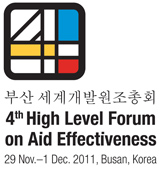This post first appeared on OECD Insights.
An editor I once worked for had a golden rule for his reporters and editors: We don’t do process. By that he meant that news stories should focus on what had happened, not the tedious ins and outs of how it had happened. Not bad advice it you want to write a vivid story, and many journalists would probably subscribe to it. Indeed, it may help to explain why there’s such a gap in public awareness regarding two of the landmark development declarations of the 2000s.
The first, the Millennium Development Goals, is known worldwide. Under eight main headings, it sets down a series of anti-poverty goals to be attained by the year 2015, including a memorable pledge to cut by half the number of people living on less than a dollar a day.
The second declaration is less well known, in part, perhaps, because it’s all process. While the Millennium Development Goals are about what development should seek to achieve, the Paris Declaration on Aid Effectiveness is about the processes developing and developed countries should follow to achieve those goals. The language of the declaration and its five core principles can be a little obscure, but the message basically boils down to this: Development won’t happen sustainably unless developing countries themselves – and not donors – take the lead in setting priorities and coordinating activities.
Since it was adopted in 2005, the Paris Declaration has been widely credited with helping to reshape relations between donor and developing countries – development expert Homi Kharas describes the process that created the declaration as a “watershed”. But whether enough has really changed is a matter for debate: It’s probably fair to say that developing countries still feel their donor partners could do more.
How much more? That question, and many others, will be keenly debated at a major conference on development and aid effectiveness in November in the Korean city of Busan. The issues on the table are previewed in an article by OECD colleague Stephen Groff in the latest issue of Global Asia.
As Steve points out, this forum – the latest in a series over the past decade – “will be the first international meeting of its kind to focus on aid in the new development landscape”. That landscape is, indeed, new: Traditional donors in North America and Europe are facing squeezed budgets and rising pressure to get value for money for their aid budgets. Newer donors, like China, India and Brazil, are becoming ever more important players in development. And there’s the evolving political and social situation, in which, as the Arab Spring has shown, things can change in a heartbeat.
Busan will look back at what the Paris Declaration, and other agreements, have and have not achieved. But, as Steve points out, it will also look forward. “In Busan, there is the opportunity to build a fresh — and flexible — global development partnership that will include today’s diversity of actors and approaches,” he writes. “In these times of economic uncertainty, the world simply cannot afford anything less than effective aid and Busan is a critical milestone on the path to more effective development.”


Great story. Hope the forum leads to stronger partnerships and aid effectiveness.
ReplyDeleteQuestion to the moderator - How can one share a write-up on Millennium Development Goals and best practices in human development, to be published on your blog. Thank you.
Please contact us on info@wikiprogress.org with your write-up and we will contact you.
ReplyDelete